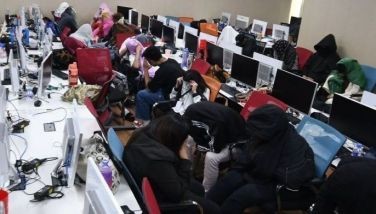41% of commercial establishments violating labor laws
July 8, 2003 | 12:00am
At least 40,000 workers nationwide were deprived of their wages and other benefits during the first quarter of the year as more than 2,000 firms were found to have violated general labor standards.
Labor and Employment Secretary Patricia Sto. Tomas said the government is set to implement a new inspection system to ensure compliance with general labor standards by commercial firms.
Figures from the Department of Labor and Employment showed that 2,695 out of the 6,603 commercial establishments inspected between January and March have not been giving their workers wages, 13th month pay, overtime compensation, and other benefits due them under the law.
Non-compliance with the minimum wage law accounted for 16.2 percent of the total recorded violations of the commercial firms inspected.
However, DOLE officials said the 1,159 violators this year was "way below" the 3,845 reported during the same period last year.
Of the delinquent firms, 59.2 percent had immediately complied with legal requirements after inspection, which benefited a total of 10,926 workers, officials added.
Earlier, the Trade Union Congress of the Philippines warned of more violations of general labor standards after a new law exempting small enterprises from paying the minimum wage takes effect.
Meanwhile, the militant Partido ng Manggagawa (PM) said yesterday large garment exporters are liable for the substandard working conditions in their subcontractors, although they are following labor standards in their factories.
"Workers are less paid and more abused in subcontracting firms because the sole reason why garments exporters resort to subcontracting is cheap and docile labor," said PM chairman Renato Magtubo.
He said reforms should be introduced to the Labor Code to provide "harsher penalties" like imprisonment for abusive employers.
"Labor Code violations should be criminalized and sweatshop operations must be considered a heinous crime," he said.
"Garments exporters subcontract part of their production process to small and medium scale enterprises, where workers endure the most appalling working conditions and severest forms of capitalist abuse."
The "epidemic of contractualization" is the root cause of abuses against workers, he added.
Magtubo has condemned the proliferation of sweatshops in the garments industry. –Mayen Jaymalin
Labor and Employment Secretary Patricia Sto. Tomas said the government is set to implement a new inspection system to ensure compliance with general labor standards by commercial firms.
Figures from the Department of Labor and Employment showed that 2,695 out of the 6,603 commercial establishments inspected between January and March have not been giving their workers wages, 13th month pay, overtime compensation, and other benefits due them under the law.
Non-compliance with the minimum wage law accounted for 16.2 percent of the total recorded violations of the commercial firms inspected.
However, DOLE officials said the 1,159 violators this year was "way below" the 3,845 reported during the same period last year.
Of the delinquent firms, 59.2 percent had immediately complied with legal requirements after inspection, which benefited a total of 10,926 workers, officials added.
Earlier, the Trade Union Congress of the Philippines warned of more violations of general labor standards after a new law exempting small enterprises from paying the minimum wage takes effect.
Meanwhile, the militant Partido ng Manggagawa (PM) said yesterday large garment exporters are liable for the substandard working conditions in their subcontractors, although they are following labor standards in their factories.
"Workers are less paid and more abused in subcontracting firms because the sole reason why garments exporters resort to subcontracting is cheap and docile labor," said PM chairman Renato Magtubo.
He said reforms should be introduced to the Labor Code to provide "harsher penalties" like imprisonment for abusive employers.
"Labor Code violations should be criminalized and sweatshop operations must be considered a heinous crime," he said.
"Garments exporters subcontract part of their production process to small and medium scale enterprises, where workers endure the most appalling working conditions and severest forms of capitalist abuse."
The "epidemic of contractualization" is the root cause of abuses against workers, he added.
Magtubo has condemned the proliferation of sweatshops in the garments industry. –Mayen Jaymalin
BrandSpace Articles
<
>
- Latest
- Trending
Trending
Latest
Trending
Latest
Recommended





























